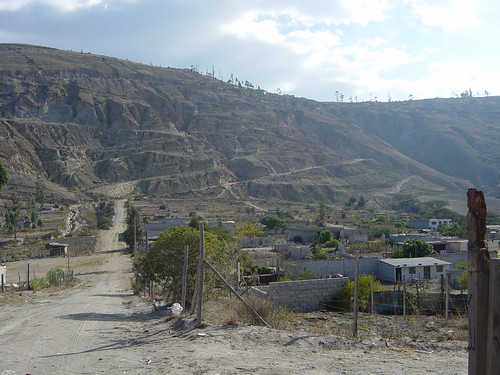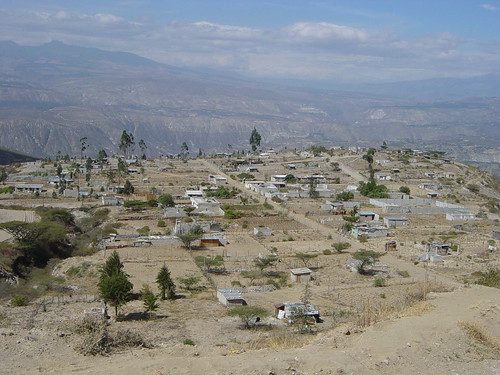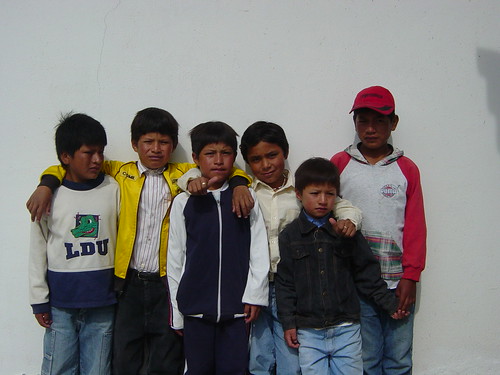Monday, February 06, 2006
Planadas Community (part 1)
Date of Event: July 22, 2005
Two nights ago at about 7:00 p.m., I brought home our new vehicle, a 2001 Ford Explorer with 83,000 km. Yesterday morning one of our missionaries asked if I wanted to try out the 4x4. The children from two new church plants were playing a football game (soccer), and the pastors asked our two families to join them.
We headed out of town about twenty minutes, then the road got a little rougher, then a little worse, and then finally it went down to dirt, sand, big ruts, and rocks. I moved the button, and my 4x4 was on. Then we started going down the side of this mountain in a series of hairpin turns. It’s one of those things that you really have to experience yourself to appreciate: the bouncing, the wind blowing dust so that you can’t see in front of you, the incredible view. Down below it looked like there was about a 5 square mile plateau. On two sides the mountain went up. We were coming down one of these. On the other two sides was a steep drop off. As far as I could see, I saw mountains.
About half way down the mountain the Jesus Film coordinator who was leading us stopped and picked up about 10 boys and stuffed them in the back of his Chevy Blazer. I found out later that they had walked about four miles or so. Instead of taking the road which snaked back and forth, they were sliding on their back side from a higher part of the road to a lower part. I guess it was a short cut for them. Finally, we leveled off and drove a mile on the dirt road to the new church plant just two months old. The North Andean Field (NAF) had purchased the property and on it stood a ‘building.’ The sign read: “Iglesia del Nazareno.” This is where 40 or so worship here at 3:00 on Sunday afternoons. No electricity nor running water. The church was started with the Jesus Film.
Planadas Community (part 2)
The pastors led them in a song with wild motions, and one of them prayed. Then they took off running down to the football field. The pastors chalked the lines. Then they started. The field had rocks and volleyball poles, but the boys were in heaven. There were nine on each side; some of our children played as well. The field was covered in several inches of dirt and as the ball went down the field and all the boys chased after it, the wind blew the dust everywhere. In front of one of the goals was about six inches of dust. Several times that team got close to scoring—everyone kicking at the ball. The dust was so thick we could barely make out the kids, let alone the ball. But these boys of about eight or so years had skill. They knew the rules. They played hard.
At half time, the boys were treated to coca-cola.
Planadas Community (part 3)
Shortly after that, we headed back up the mountain starting in 4x4 low. When we got about three-fourths of the way up, I looked down and saw those boys still playing hard in the middle of that desert plateau. I couldn’t help but thank God for those men who planted those churches and invested a hot, dirty afternoon in their lives. Then I prayed, “Lord, will you call one or two or more of those boys to pastor? Perhaps you might send them to the seminary and let me meet them again when I know Spanish and can talk with them? Maybe you can raise these boys up to plant new churches and play football with other little boys on a hot, dry afternoon? Oh, Lord, let it happen.”
Wednesday, February 01, 2006
Fix Your Eyes Part 2 January 11, 2006
We have a gardener who works on the mission property who does excellent work. He and his wife have three children. He rides his bike about six miles to work. Many times his wife comes with the children in the afternoon and they all work together. The thing which impresses me about this family is their contentment in Christ. On a holiday I asked him what he would do. He said, “I’ll have time to read the Word and practice worshiping God.” He plays the guitar.
Friday I drove him home with his bike in the back of my Explorer. On the way home he volunteered: “God has given me victory in all of my trials.” I asked, “Do you have a lot of trials?” He assured me he did, and then explained how he was falsely accused and put into jail. I didn’t understand the whole story, but the guards had a guitar and he said he’d play it for them. He played hymns and praise choruses. The police liked it so much they let him out the next day.
Then he told me that he prayed for six years that he could be a gardener. One day the Lord told him to quit asking and start seeking. So the next Sunday he talked with my pastor who knew about the need for a gardener for the mission property. Since then you’ve never seen such a love affair between a man and plants. And on his lunch break I often see him sitting in the shade reading his Bible.
His world is so different from mine. I told him about the story of me getting locked in a bathroom. I tried to explain to him that in the United States the men do not publicly use the restroom. He said, “Wow, what discipline!” I responded, “Not really, we have a lot more bathrooms in the states.” That seemed to satisfy him.
When we got to the house he asked me in for a cup of coffee. “Please, I’d like for you to enter my home.” I didn’t really have time—or so I thought. Sherri was holding supper, so I called her and told her I’d be about twenty minutes late. First I got a tour of the yard. He had flowers in a garden, three chickens that would be ready to eat in about fifteen days, and in the back he had concrete basins with water for washing clothes. Inside he had a brand new refrigerator—about half the size of mine. This was a Christmas gift for his wife. We sat in the small front room on sofas with sheets over them. There were no doors, but sheets which separated the rooms. He took his rather ancient looking guitar and played me several songs. His wife was working in the kitchen. I got up to leave, but he insisted it would not take too much longer.
We talked about the Bible and he sang another song. I got up to leave, but he insisted I stay. Finally, his wife came in with a big grin on her face. She had prepared supper for me: coffee, two roles with cheese, rice, and a fried egg. She then brought out a plate for her husband and son. The table wasn’t real big so the girls ate in the kitchen.
While we ate I told him the story of why we are in Ecuador. God was gracious and gave me words in Spanish and helped me as I read his Spanish Bible and answered some of his questions. He said to me, “It is a great privilege for us that you eat in our home.” All I could say was, “Thank you for inviting me.” But my heart told me that I had a lot to learn from this man, who calls his bike “my little car,” who has seen the gadgets of the modern world but thanks the Lord every day for his job of turning over dirt with a spade. His eyes are clearly fixed on Jesus, and he has found great contentment in what he sees.
Fix Your Eyes: December 11, 2005
In our daily routine, Sherri and I drop Mary and Landon off at school on our way to language school. The traffic here is muy loco (very crazy). I’ve been told that there are ten times more cars on the road in Quito than there were five years ago. Also, there are more taxis in Quito than there are in New York City. Most drivers are first generation drivers and do not have the experience or knowledge of proper road etiquette necessary to satisfy my driving disposition--although driving for Domino’s pizza turns out to be good missionary training.
Here motorcycles follow the rules of the road when it is convenient. Often times after a lot of considerable maneuvering and passing of cars, I’m in the lead at a red light. Then a motorcycle winds its way between cars and pulls in front of me. They act like the dotted white line that divides the lanes is actually the motorcycle line. If that isn’t frustrating enough, most of the motorcycles have engines barely larger than a moped, so when the light turns green, I have to wait while the cars in the other lane (that I had worked so hard to pass) pass me.
By the way, I’ve seen motorcycles driving on the sidewalks. Several times I’ve seen a family of four on a 150cc motorcycle: dad driving, little boy in front holding the handlebars, mom in back with a baby between mom and dad. However, one of my favorite road observations was an elderly man on a bicycle. He appeared to be around 60 years old. He had his lawn business somehow tied on the back, including a shovel, other hand tools, and a lawn mower!
With the increase in the number of cars, there has not been an increase in the infrastructure to handle the cars. There is one area called the “Labrador” where the cars in four lanes have about twenty-five yards to merge into four other lanes. The two middle lanes go across a very narrow bridge. The left lane goes down and merges onto another road. The right lane goes to the airport. Often times during rush hour a car will be in the far left lane and try to get into the right airport lane. Actually, a car from any lane can go anywhere—and they often do. There are no observable rules for this merger, but it does help to have a Ford Explorer with a cattle grill on the front. But my vehicle is about one-fourth the size of the buses, and these just go wherever they want. However, if I can get my bumper in front of the bus’s bumper, then they usually back away. Landon has a phrase he likes to say while we’re going through the Labrador, “Dad’s takin’ on the buses!”
One morning when we were running late and I was a little more forceful than usual in going through the Labrador, Sherri said to me, “Honey, you’re here to convert people to Christ, not to convert the driving habits of the Ecuadorians.” She knows me very well. My eyes were on my own desire to get where I wanted. I certainly wasn’t seeing the people from a spiritual point of view.
A Bathroom Experience: August 2005
During my first few weeks in Ecuador, I determined that exposing myself to the culture did not include adopting all of its practices. It was with that attitude that I walked into a bathroom in a government building. Both the men’s and women’s bathroom doors were wide open. So, I decided that my visit to the men’s bathroom would include closing the door behind me. And this I did. However, when the latch on the door closed, the doorknob came off in my hand, and a couple of metal parts clanged on the tile floor. I tried to put the knob back on, but it wouldn’t go on. After using the bathroom and washing my hands in privacy (except for a peep-hole in the door), I now had the task of getting out of there.
For several minutes, I worked with the knob. I’m usually pretty handy, but nothing worked. Then I had an idea. I could stand on the urinal and climb over the wall. However, the wall was portable looking—kind of like an office divider. I thought that my weight might pull the urinal off of the wall. I had thoughts of a Nazarene missionary put in jail for vandalizing and flooding a bathroom. My next thought was to call out to someone. But I didn’t know what to say in Spanish, and my missionary friend who knew Spanish wasn’t anywhere near. So, I started playing with the knob again and after about fifteen minutes, I finally got the door open.
When I got back, Landon had to go to the bathroom. I showed him where it was and told him, “Don’t close the door!” So, our answer to the email question is that we’re adjusting to the culture real well.



